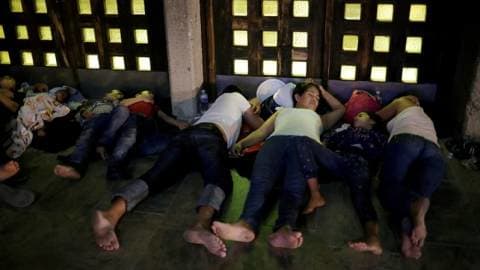
(Reuters) - The American Civil Liberties Union and other groups that sued to block the Trump administration's latest initiative to bar almost all asylum-seekers at the U.S.-Mexico border have asked courts to freeze the measure while their cases are heard.
The ACLU filed documents on Wednesday asking for a temporary restraining order in the U.S. District Court for the Northern District of California.
Two other immigrant advocacy groups which sued the Trump administration in U.S. District Court in Washington D.C. on Tuesday have also asked the court to halt its implementation.
President Donald Trump's new policy announced on Monday requires asylum-seekers to first apply in one of the countries they traveled through before arriving at the southern U.S. border.
If they do so and are rejected, only then do they become eligible to apply in the United States. The change effectively shifted the responsibility for processing asylum claims to countries such as Mexico and Guatemala.
The rule, which took effect on Tuesday, is Trump's latest attempt to stem a surge in Central American migrants and bolster political support ahead of his 2020 re-election bid.
The ACLU and other groups say the rule violates U.S. and international law.
Administration officials have described the new asylum policy as a necessary measure due to an overwhelming number of fraudulent asylum claims. Record numbers of Central Americans, mainly Guatemalans, have reached the United States this year, overwhelming immigration facilities.
The Justice Department declined to comment on Wednesday, and the White House did not immediately respond to a request for comment.
The ACLU's lawsuit argues that U.S. law establishes that an asylum-seeker can only be required to seek protection in another country under two conditions: when the United States has a "safe third country" agreement in place, or when the asylum-seeker has firmly resettled in another country.
The United States is seeking "safe third country" agreements with Mexico and Guatemala, but they have resisted. Just traveling through a country is insufficient to establish someone has firmly resettled there, the lawsuit says.
As a result, the new rule would force people to return to their home countries, which often "are rife with danger and violence," the suit says.
Civil rights groups are seeking a hearing on their request for a restraining order at 1730 ET (2130 GMT) on Thursday in the San Francisco federal court, according to a court document.
(Reporting by Andrew Hay in Taos, New Mexico, additional reporting by Mica Rosenberg in New York; Editing by Sonya Hepinstall)